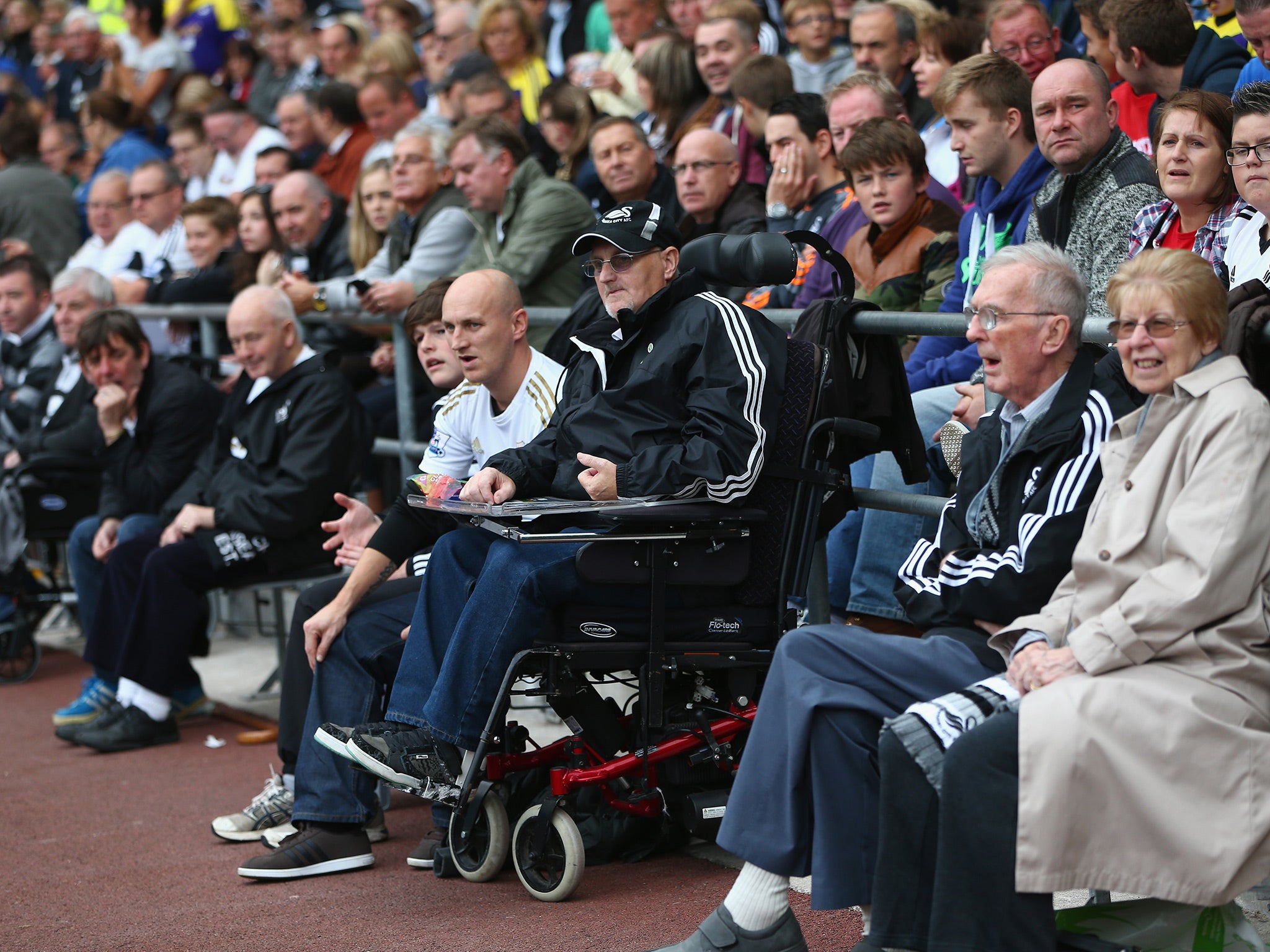Premier League clubs accused of neglecting needs of disabled fans
Only seven Premier League clubs are providing the minimum number of wheelchair spaces

Your support helps us to tell the story
From reproductive rights to climate change to Big Tech, The Independent is on the ground when the story is developing. Whether it's investigating the financials of Elon Musk's pro-Trump PAC or producing our latest documentary, 'The A Word', which shines a light on the American women fighting for reproductive rights, we know how important it is to parse out the facts from the messaging.
At such a critical moment in US history, we need reporters on the ground. Your donation allows us to keep sending journalists to speak to both sides of the story.
The Independent is trusted by Americans across the entire political spectrum. And unlike many other quality news outlets, we choose not to lock Americans out of our reporting and analysis with paywalls. We believe quality journalism should be available to everyone, paid for by those who can afford it.
Your support makes all the difference.The majority of Premier League clubs are still failing disabled supporters, according to a new study.
Analysis by the Equality and Human Rights Commission (EHRC) has revealed that only seven Premier League clubs are providing the minimum number of wheelchair spaces, and only the same number have larger, fully-equipped toilets, known as changing places, installed.
Seven clubs are also breaking the Premier League's own rules by not publishing access statements to give disabled fans essential information about their ground, a review by the EHRC has determined.
The findings were based on responses to questions put to all 20 Premier League clubs. The clubs failing to meet the minimum requirements have been given a September deadline to publish a clear action plan and timetable for improvement or face a statutory investigation from the EHRC.
Commission chairman David Isaac said: “The end of the season is fast approaching and time is running out for clubs. The information we received from some clubs was of an appalling standard, with data missing and with insufficient detail. What is clear is that very few clubs are doing the minimum to meet the needs of disabled supporters.
“The Premier League itself does not escape blame. They need to make the concerns of disabled fans a priority and start enforcing their own rule book. We will be meeting individual clubs and asking them to explain themselves and tell us what their plans are.”
The equality watchdog said it would be opening a call for evidence from the end of the season and speaking to disabled supporters' groups to find out their experiences.
It said that in the coming weeks an EHRC team would meet with those clubs who failed to provide adequate information of accessibility or have in place any plans for improvement. It will also meet those clubs that are designing new grounds or stands, to ensure they “aspire to a first-class experience for disabled fans, not just to meeting the bare minimum”.
What is clear is that very few clubs are doing the minimum to meet the needs of disabled supporters.
Clare Lucas, activism manager for learning disability charity Mencap, said: “For too long Premier League clubs have neglected the needs of their disabled fans, many of whom are forced to be changed on toilet floors, because clubs are yet to install proper changing places facilities. It is simply inexcusable.”
The Premier League is set to publish a report in August to highlight the work undertaken by clubs to improve disabled access provisions in the preceding two years.
A statement from the Premier League read: “In September 2015 Premier League clubs unanimously agreed to improve their disabled access provisions by meeting the Accessible Stadia Guide (ASG) by August 2017.
“Clubs are working hard to improve their facilities and rapid progress has been made. The improvements undertaken are unprecedented in scope, scale and timing by any group of sports grounds or other entertainment venues in the UK.
“Given the differing ages and nature of facilities, some clubs have faced significant built environment challenges. For those clubs cost is not the determining factor.
“They have worked, and in some cases continue to work, through issues relating to planning, how to deal with new stadium development plans, how to best manage fan disruption or, where clubs don't own their own grounds, dealing with third parties.
“Clubs will continue to engage with their disabled fans and enhance their provisions in the coming months, years and beyond.”
PA
Join our commenting forum
Join thought-provoking conversations, follow other Independent readers and see their replies
Comments